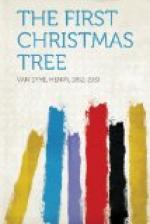“Yes, my Prince, both bow and spear shalt thou have, for the way is long, and thou art a brave huntsman. But in darkness thou must journey for a little space, and with eyes blindfolded. Fearest thou?”
“Naught fear I,” said the boy, “neither darkness, nor the great bear, nor the were-wolf. For I am Gundhar’s son, and the defender of my folk.”
Then the priest led the child in his raiment of lamb’s-wool to a broad stone in front of the fire. He gave him his little bow tipped with silver, and his spear with shining head of steel. He bound the child’s eyes with a white cloth, and bade him kneel beside the stone with his face to the east. Unconsciously the wide arc of spectators drew inward toward the centre, as the ends of the bow draw together when the cord is stretched. Winfried moved noiselessly until he stood close behind the priest.
The old man stooped to lift a black hammer of stone from the ground,—the sacred hammer of the god Thor. Summoning all the strength of his withered arms, he swung it high in the air. It poised for an instant above the child’s fair head—then turned to fall.
One keen cry shrilled out from where the women stood: “Me! take me! not Bernhard!”
The flight of the mother towards her child was swift as the falcon’s swoop. But swifter still was the hand of the deliverer.
Winfried’s heavy staff thrust mightily against the hammer’s handle as it fell. Sideways it glanced from the old man’s grasp, and the black stone, striking on the altar’s edge, split in twain. A shout of awe and joy rolled along the living circle. The branches of the oak shivered. The flames leaped higher. As the shout died away the people saw the lady Irma, with her arms clasped round her child, and above them, on the altar-stone, Winfried, his face shining like the face of an angel.
[Illustration—Then Winfried told the story of Bethlehem]
IV
THE FELLING OF THE TREE
IV
A swift mountain-flood rolling down its channel; a huge rock tumbling from the hill-side and falling in mid-stream; the baffled waters broken and confused, pausing in their flow, dash high against the rock, foaming and murmuring, with divided impulse, uncertain whether to turn to the right or the left.
Even so Winfried’s bold deed fell into the midst of the thoughts and passions of the council. They were at a standstill. Anger and wonder, reverence and joy and confusion surged through the crowd. They knew not which way to move: to resent the intrusion of the stranger as an insult to their gods, or to welcome him as the rescuer of their darling prince.
The old priest crouched by the altar, silent. Conflicting counsels troubled the air. Let the sacrifice go forward; the gods must be appeased. Nay, the boy must not die; bring the chieftain’s best horse and slay it in his stead; it will be enough; the holy tree loves the blood of horses. Not so, there is a better counsel yet; seize the stranger whom the gods have led hither as a victim and make his life pay the forfeit of his daring.




